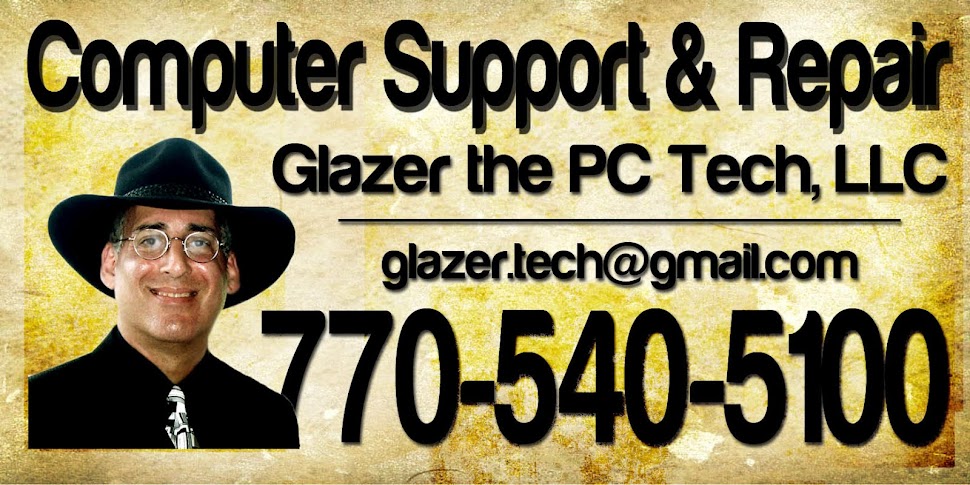[Although this is my 100th column in the Times, this blog is missing a few of my earlier published pieces; the reason why the numbers don't jive.....FYI - ag]
Computer Care: Revisiting some key tips on column No. 100
By Arthur Glazer
POSTED: November 12, 2011 1:00 a.m.
When I began writing this column back in 2007, it was sporadic at best. My intent was to assist the novice computer user and not have it sound like a manual. I strayed from that format a few times by expressing my opinions while maligning Vista or praising Windows 7, and I've discussed technology in general many times.
This being my 100th Computer Care column in the Times, I wanted to go back to where I began. So here are 10 useful tips that everyone should be able to appreciate, whether a novice or seasoned user, whether using Windows XP, Vista or 7.
It's always a good idea prior to making any changes to your system, to create a system restore point first. In XP, it's in Accessories under System Tools. In Vista and Win 7, just do a search for it.
Change a desktop icon. If you're tired of looking at the same manila folder icon all over your desktop, change some of them. Right-click on the icon to modify, click on "Properties," choose the "Customize" tab and then click the "Change Icon" button. Pick one from the library or browse to one of your own.
Change a desktop image. In XP, right-click on your desktop, go to "Properties," and then to the "Desktop" tab and choose an image from the list. In Vista/Win 7, right-click the desktop and choose "Personalize," then click on "Desktop Background."
Adjust a power scheme. In XP, again right-click the desktop and choose "Properties." This time go to the "Screen Saver" tab and click the "Power" button. From there you can adjust when the system sleeps or turns off.
In Vista, go to Control Panel, then to Power Options. In Win 7, type "Power" in the search box and from the options, create or edit a power plan.
Unlock the desktop icons. To be able to reorder the icons to your liking, right-click on the desktop in all versions of Windows. In XP, choose "Arrange Icons By," and uncheck the "Auto Arrange" option. In Vista/7 choose "View," and uncheck the same.
Choose which application opens what file. To change this, simply right-click the icon of the file in question and go to "Open With." If for example, Windows uses Picture Viewer or Paintshop to open an image and you want to use Photoshop, from "Open With," navigate to Photoshop. Click "Apply" and "OK." There is also a box to check that keeps this option should you want to keep using Photoshop.
How to save ink. Most printer software has options to change the paper size, paper type and quality of the print. Photo printing uses the most ink; the draft option uses the least amount.
Put web shortcuts on your desktop. From an open browser (Internet Explorer, Firefox or Chrome), reduce the size to half and drag the icon from in front of the address in the address bar to your desktop. Do this by holding the left mouse button down while dragging. If the name of the shortcut is too long, right-click the new icon and "Rename" it. If you created a shortcut from Firefox, but Chrome is your default browser, the icon will be that of Chrome.
Tidy up your desktop. If you have all types of icons all over your desktop, here's an easy way to organize it. Right-click the desktop and choose "New," then "Folder." Call it what you want. I have one for PDF files, one for Utilities and one I call "Closet," for miscellaneous junk without a home.
Right-click and "Rename" the new folders to call them what you want. The simply drag your scattered files to their respective new folders.
Pin items to your taskbar. XP has a Quick Launch bar near the Start Button on the Taskbar. If it isn't enabled, right-click on the taskbar, click "Toolbars," and then click Quick Launch. To add items just drag them from the desktop to that area of the taskbar, copying them. They are always seen (thus Quick Launch).
Vista and Win 7 uses the same concept, but uses full-size icons in the taskbar. Right-click and choose "pin" or "unpin" on the icons on the bar.
Refresh system memory. Even when computer programs are closed, not all of the memory used is released. There are utilities that refresh the memory at the click of a button, but they're not included in Windows. What you can do is simply reboot the system: Turn it off and then on again. The RAM will be refreshed and you'll be able to access all that there is, making your system run faster.
Use the last tip for trying to fix anything that ails your system. Often a simple reboot fixes many little things in a computer. It may even stop the dreaded blue screen error messages, although they usually demand more attention.
When in doubt, reboot. It certainly couldn't hurt.
Keep those emails coming, and thanks for reading.
Arthur Glazer is a freelance writer and computer technician in Gainesville. His column appears biweekly on the Business page and on gainesvilletimes.com.
